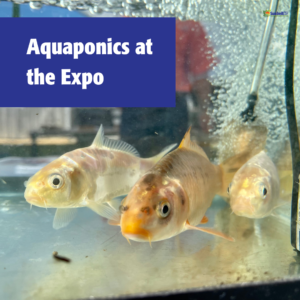 If you are looking to diversify your agricultural knowledge on fish farming, hydroponics, or a more sustainable way to grow your food; look no further, visit the Aquaculture Building. This exhibit will provide you with tremendous learning opportunities through hands-on demonstrations, interactive exhibits, and live animals.
If you are looking to diversify your agricultural knowledge on fish farming, hydroponics, or a more sustainable way to grow your food; look no further, visit the Aquaculture Building. This exhibit will provide you with tremendous learning opportunities through hands-on demonstrations, interactive exhibits, and live animals.
So, whether you are from the busy city or the rural countryside, this exhibit will allow you to have a better understanding of the role that fish, aquaculture,and hydroponics play in global food production. You will be able to explore opportunities with alternative crops and increase your knowledge of new ways to produce fish and plants. Weed management, casting practice, eating farm-raised catfish, and gaining a basic understanding of aquaculture are all things that you can experience at the Aquaponics Building and Fish Pond.
As the world continues to grow, so do our sustainable agriculture options. Aquaponics is a combination of Aquaculture and Hydroponics. Aquaculture allows people to grow their own food because it is possible to do in even the busiest of cities. These are two options that many people consider when planning their personal sustainable farms. But, the combination of both can make for a self-sustaining system.
Dr. David Cline is one of the many professionals that will be representing Aquaculture at this year’s Expo. Cline has 35+ years of experience in aquaculture, ornamental, and recreational pond management experience, past president of the United States Aquaculture Society, and a board member of the World Aquaculture Society.
Such rising concerns about food security have many everyday people looking for a new way to grow and raise their own fish and vegetables in their backyard because of the fear of food security. Food security stems back to the idea of having access to a reliable and sufficient supply of nutritious food. “The nice thing about aquaponics is you can grow a lot more product on the same footprint and you are able to do it just about anywhere,” said Dr. David Cline, Associate Extension Professor at Auburn University’s School of Fisheries, Aquaculture and Aquatic Sciences. With the population steadily increasing this more sustainable option looks like the key to feeding the world.
Food security is a growing issue both within the United States and globally because of the continued population increase. Dr. Cline said, “Aquaculture will provide healthy protein and plants for future generations because it is one of the most efficient ways to convert feed grade protein into food grade protein.” This system of growing and raising plants and fish will allow for substantial amounts of food to be produced on a much smaller scale.
The Aquaponics Building and Fish Pond will allow you to experience interactive exhibits and speak with experts. Be sure to check out your show directory for all listings of events.
